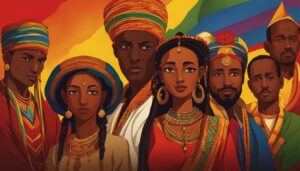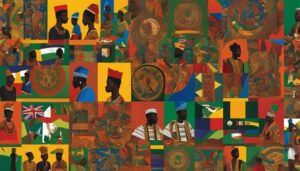South Africa is a multilingual nation with a rich linguistic diversity, boasting 11 official languages. Sepedi, Sesotho, Setswana, siSwati, Tshivenda, Xitsonga, Afrikaans, English, isiNdebele, isiXhosa, and isiZulu are all recognized as official languages in the country. IsiZulu is the largest language, spoken by almost a quarter of the population, followed by isiXhosa, Afrikaans, and English. English, in particular, plays a significant role as a second language and is widely used in government, media, and business. Afrikaans, which evolved from Dutch, is also spoken by a significant portion of the population. It’s important to note that South Africa embraces its linguistic diversity, and many individuals in the country are multilingual, speaking multiple languages.
Key Takeaways:
- South Africa has 11 official languages, including isiZulu, isiXhosa, Afrikaans, and English.
- English is widely used as a second language and dominates in government, media, and business.
- Afrikaans, a variant of Dutch, is spoken by a significant portion of the population.
- Multilingualism is prevalent in South Africa, with many individuals speaking multiple languages.
- Linguistic diversity is an integral part of South Africa’s identity and culture.
Official Languages of South Africa
The official languages of South Africa reflect the country’s diverse heritage, encompassing the Nguni, Sotho, and Tswana language families. With a total of 11 official languages, South Africa is a linguistically rich nation.
The Nguni language family includes isiZulu, which is the largest language in South Africa, spoken by almost a quarter of the population. It is closely followed by isiXhosa, another prominent language in the country. These languages are predominantly spoken in the eastern regions of South Africa, including KwaZulu-Natal and Eastern Cape.
The Sotho language family encompasses three languages: Sesotho, isiNdebele, and Sepedi. Sesotho is widely spoken in the Free State and Lesotho, while isiNdebele is primarily spoken in Mpumalanga and Gauteng. Sepedi, also known as Northern Sotho, is mostly spoken in the northern parts of the country.
| Nguni Languages | Sotho Languages | Tswana Language |
|---|---|---|
| isiZulu | Sesotho | Setswana |
| isiXhosa | isiNdebele | |
| Sepedi |
The Tswana language, Setswana, is spoken mainly in the northern regions of South Africa, including North West and parts of Gauteng. It is also one of the most widely spoken languages in Botswana.
English is another significant language in the country and is widely used as a second language. It holds a dominant position in government, media, and business. Afrikaans, a language with Dutch roots, is spoken by a considerable portion of the population, particularly in the Western Cape and Northern Cape provinces.
South Africa’s linguistic diversity is a testament to the rich cultural heritage of the country and the ability of its people to comfortably communicate in multiple languages. Multilingualism is prevalent, and many individuals are fluent in more than one South African language. This linguistic diversity contributes to the unique identity and unity of the nation.
The Role of English in South Africa
English plays a pivotal role in South Africa, serving as a second language and functioning as the dominant language in government, media, and business. With its historical ties to British colonization and the global influence of the English language, it has become a common tool for communication and a unifying force among diverse communities.
In South Africa, English proficiency is highly valued and is often seen as a gateway to educational and economic opportunities. It is taught in schools and universities across the country, allowing individuals to access a wider range of information and enhance their prospects in a globalized world.
One of the key reasons for the prominence of English in South Africa is its status as an official language. Alongside 10 other indigenous languages, English holds an important position in the linguistic landscape of the country, facilitating communication between different language groups and contributing to social cohesion.
It is worth noting that South Africans often exhibit multilingual proficiency, with many individuals being able to speak multiple languages fluently. This multilingualism reflects the rich cultural diversity of the nation and serves as a testament to the adaptability and resilience of its people.
| Official Languages of South Africa | Number of Speakers |
|---|---|
| IsiZulu | Approximately 25% of the population |
| IsiXhosa | Approximately 15% of the population |
| Afrikaans | Approximately 13% of the population |
| English | Approximately 10% of the population |
English serves as a bridge between the diverse linguistic communities in South Africa, fostering inclusivity and promoting understanding across different cultures. It has become an integral part of the national identity, reflecting the country’s history, values, and aspirations.
The Importance of Language Diversity
Language diversity is not only a reflection of South Africa’s past but also an important aspect of its present and future. It is a symbol of the country’s rich heritage and contributes to the multicultural fabric of society. Embracing linguistic diversity allows for the preservation of cultural traditions and the celebration of different ways of life.
As South Africa continues to evolve and adapt to a rapidly changing world, language remains a powerful tool for shaping the nation’s identity and ensuring that all citizens are heard. By recognizing the importance of various languages, including English, South Africa can nurture an inclusive society where everyone’s voice is valued and respected.
Afrikaans: A Language with Dutch Roots
Afrikaans, a language with its roots in Dutch, has a significant presence in South Africa and is spoken by a considerable portion of the population. With its unique history and development, Afrikaans has become a language that reflects the diverse cultural heritage of the region.
Derived from 17th-century Dutch dialects, Afrikaans evolved as a language of its own through the influence of various indigenous languages and other European languages. Today, it is one of the 11 official languages in South Africa, showcasing its importance in the country’s linguistic landscape.
Afrikaans holds immense cultural significance, often associated with the Afrikaner community and their history in South Africa. It serves as a means of preserving and expressing their heritage, traditions, and identity. Additionally, Afrikaans has found its place in literature, music, and media, contributing to the rich cultural tapestry of the nation.
Afrikaans in South Africa: A Statistical Overview
| Language | Percentage of Speakers |
|---|---|
| IsiZulu | 24.7% |
| IsiXhosa | 15.6% |
| Afrikaans | 12.1% |
| English | 8.2% |
According to recent data, approximately 12.1% of the South African population speaks Afrikaans, making it one of the most widely spoken languages in the country. Notably, it is spoken predominantly in the Western Cape and Northern Cape provinces, areas where the Afrikaner community has a significant presence.
As South Africa continues to embrace its linguistic diversity, Afrikaans remains an important part of the nation’s cultural fabric. While English plays a dominant role in various spheres of society, Afrikaans serves as a testament to the rich history and heritage of the Afrikaner community, contributing to the overall linguistic tapestry of South Africa.
Multilingualism in South Africa
South Africa is a linguistically diverse nation, with many individuals being multilingual and fluently speaking multiple languages. With 11 official languages, the country celebrates and embraces its rich linguistic heritage. This multilingualism is not only a reflection of the cultural diversity of South Africa but also plays a crucial role in shaping the country’s identity.
One of the most significant aspects of multilingualism in South Africa is the prevalence of indigenous languages. IsiZulu, spoken by almost a quarter of the population, is the largest language in the country. It is followed closely by isiXhosa, Afrikaans, and English. These languages are not only spoken by specific ethnic groups but have also become part of the broader South African identity.
In addition to the official languages, there are many other languages spoken in South Africa. The linguistic landscape includes languages from various language families, such as Nguni, Sotho, Tswana, and more. This linguistic diversity is not only confined to different regions but also exists within communities and households.
| Language | Number of Speakers |
|---|---|
| IsiZulu | Over 11 million |
| IsiXhosa | Over 8 million |
| Afrikaans | Over 6 million |
| English | Over 4 million |
This linguistic diversity also fuels the use of multiple languages in various domains of daily life. Many South Africans are proficient in more than one language, allowing for better communication and understanding across cultural and linguistic barriers. The ability to switch between languages is not only a practical necessity but also a testament to the social cohesion that exists in South Africa.
In conclusion, South Africa’s linguistic landscape is a testament to its diversity and multicultural heritage. With 11 official languages and a population that is multilingual, the country celebrates the richness of its languages. This linguistic diversity plays a vital role in shaping South Africa’s identity and fostering unity among its diverse communities.
Conclusion
In conclusion, South Africa’s linguistic diversity is a testament to its rich cultural heritage, with 11 official languages representing various language families and communities. The country embraces its multilingualism, recognizing and celebrating the unique linguistic traditions that have shaped its identity.
Among the 11 official languages, IsiZulu takes the lead, spoken by almost a quarter of the population, followed by IsiXhosa, Afrikaans, and English. English, although not a native language, plays a significant role as a second language and dominates in governmental, media, and business contexts.
Afrikaans, with its roots in Dutch, maintains its relevance as a widely spoken language in South Africa. It holds importance in certain regions and among specific communities, adding further depth to the linguistic tapestry of the country.
South Africa’s multilingualism is a vibrant reflection of its multicultural society. Many individuals possess the impressive ability to fluently speak multiple languages, allowing for communication and understanding across diverse communities. This linguistic richness fosters a deep sense of cultural pride and unity in the nation.
FAQ
What languages are spoken in South Africa?
In South Africa, there are 11 official languages: Sepedi, Sesotho, Setswana, siSwati, Tshivenda, Xitsonga, Afrikaans, English, isiNdebele, isiXhosa, and isiZulu.
Which is the largest language in South Africa?
IsiZulu is the largest language in South Africa, spoken by almost a quarter of the population.
What are the other commonly spoken languages in South Africa?
Other commonly spoken languages in South Africa include isiXhosa, Afrikaans, and English.
Is English widely used in South Africa?
Yes, English is widely used as a second language in South Africa and is the dominant language in government, media, and business.
What is the significance of Afrikaans in South Africa?
Afrikaans, a version of Dutch, is spoken by a significant portion of the population in South Africa and holds cultural and historical significance.
Are South Africans multilingual?
Yes, South Africans are known for their multilingualism, with many individuals speaking multiple languages and embracing the linguistic diversity of the country.



